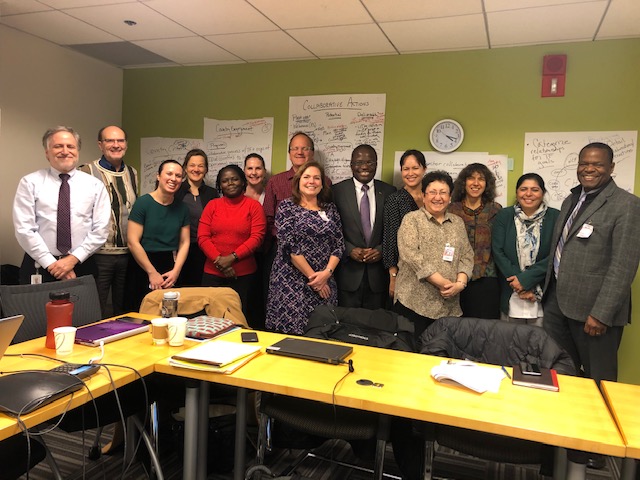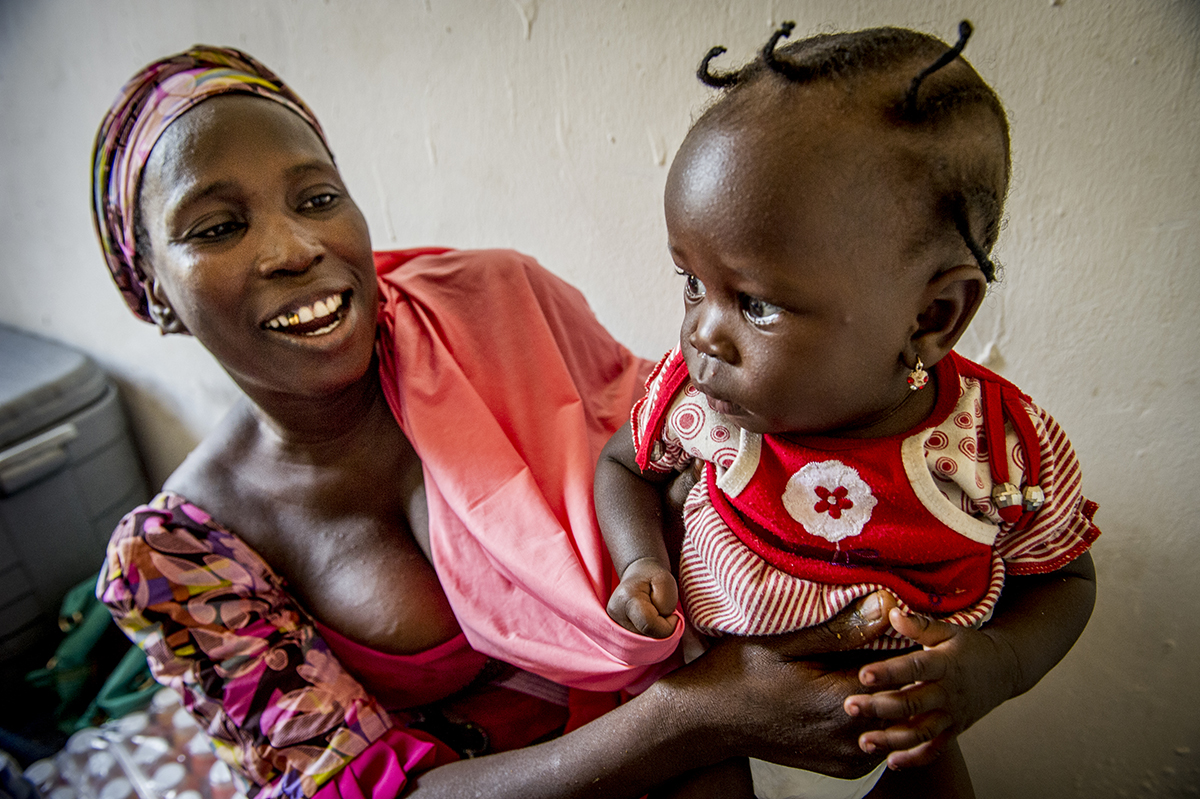GREETINGS from the TASK FORCE SECRETARIAT
LANDSCAPE ANALYSIS OF SURVIVE, THRIVE, AND TRANSFORM INTERVENTIONS FOR CHILDREN
The survival and well-being of women, children, and adolescents are essential to accomplish the Sustainable Development Goals. With the Global Strategy for Women's, Children's, and Adolescents' Health (2016-2030) providing a roadmap to achieve the three pillars of survive, thrive, and transform, interventions and approaches that promote children thriving are in the forefront at both global and country levels.Yet the extent to which these efforts are implemented within the context of child survival platforms is unknown.
Lynette Friedman and Cathy Wolfheim, through USAID's flagship Maternal and Child Survival Program (MCSP), conducted a review on behalf of the Child Health Task Force to explore country experiences in adding thrive and transform interventions to platforms that deliver child survival interventions. The review sought to map out existing global guidance and understand operational experiences from Kenya, Senegal, and Zambia with additional examples from Ghana and Rwanda.
Highlights of Findings:
-
There was a clear convergence on the successes and challenges related to intervention areas, entry points, driving forces, tracking progress, and funding. Intervention areas largely focused on ECD, ECE, and nutrition. Associated interventions included birth registration, WASH, and financial or social protection. Most entry points for action were through existing child health and survival platforms, and thrive interventions are perceived as a natural extension.
-
The advice and lessons from country key informants to other countries that seek to implement the thrive and transform agenda also converged. Overlapping themes on the factors for success included: gaining high-level support, establishing the best use of multi-sector approaches at all levels and in all steps, and engaging the community.
-
The assessment discovered that the thrive and transform agenda is propelled forward and inextricably linked to the commitment of developing human capital, availability of convincing global evidence, and political momentum that needs to be maintained.
- While there is some movement related to tracking progress, it is still perceived as a weak area that requires global and country attention. Funding is also an ongoing challenge, particularly as much of the support has been from external sources.
Read the full report here. View a recording of the presentation made to the Expansion of the Child Health Package Subgroup here.
ANNUAL TASK FORCE STEERING COMMITTEE MEETING
The Task Force's Steering Committee (SC) met on December 4-5, 2019 in Washington DC to review the progress achieved against the 2019 workplan, identify and address bottlenecks in implementation of agreed actions, and to determine the priorities for 2020.
Looking ahead, the SC prioritized:
- Testing a country engagement model in collaboration with country-based stakeholders.
- Identifying opportunities for collaboration, including supporting countries to include iCCM in the malaria and health systems concept notes during the upcoming Global Fund application cycle (2020-2022), improving quality of care, and strengthening multi-sectoral collaboration.
- Planning for the 2020 Task Force members meeting.

PROJECT UPDATE: RE-IMAGINING TECHNICAL ASSISTANCE FOR MNCH & HEALTH SYSTEMS STRENGTHENING
In our ongoing effort to support the ministries of health in the Democratic Republic of the Congo (DRC) and Nigeria to use human-centered design to re-imagine technical assistance (TA) for MNCH and health systems strengthening, the Task Force and its design partner, Sonder, has made the following progress since our last update.
DRC
- After hiring a senior design consultant and a high-level stakeholder engagement consultant, the project team completed an immersion field visit to Kinshasa from November 4-8.
-
The team completed interviews with high-level stakeholders who were not previously engaged in the project, including the Government Advisor to the President on UHC and representatives from UNICEF, WHO, European Union, World Bank/Global Financing Facility, and Enabel (Belgium Development Agency).
-
The co-creation team met in two full-day meetings to reinvigorate participants for design sprint 1, which was held the second week of December. The design process will wrap-up in January 2020 with an integration workshop to present on: the shared definition of TA for the DRC, what constitutes good TA design principles, and a roadmap for implementation.
Nigeria
-
The co-creation teams met around three opportunity areas that had been identified in June 2019 which are: re-imagining interactions to build local ownership for greater sustainability; re-imagining knowledge flow to support strategic decision-making; and re-imagining incentives to build greater workforce capacity & maximize impact.
-
The team conducted additional interviews with government officials and donors, including representatives from the Senate Committee on Health, DFID, Japan International Cooperation Agency, UNICEF, and the World Bank/Global Financing Facility. The interviews were followed by a series of three design sprints from November 18-27.
-
The design process is anticipated to also conclude in January 2020 with an integration workshop that will also present on: the shared definition of TA for the Nigeria, what constitutes good TA design principles, and a roadmap for implementation.
Read more about the project here.

![]()
NEW TASK FORCE SUBGROUP LAUNCHED: QUALITY OF CARE
The Task Force proudly launched a new subgroup focusing on Quality of Care (QoC) for child health. While a number of global quality improvement initiatives exist, there are still unmet needs related to QoC for child health, including increased visibility; global and country level engagement and coordination; and an examination of the opportunities to extend the QoC agenda to community health services.
The QoC Subgroup will complement existing efforts of the QoC Network in advocacy for and implementation of pediatric QoC standards and contribute to cross-initiative and cross-organization learning on improving QoC in MNCH. The subgroup will also help to coordinate a maintained QoC focus across the Task Force's subgroups, while maintaining a primary focus on advancing pediatric QoC at the global and country level.
The QoC Subgroup is open to all members across the Task Force. Please contact childhealthtaskforce@jsi.com for more information or to participate.
CALL FOR STAGE MEMBERS
Recently, WHO solicited global nominations for experts to serve on the Strategic and Technical Advisory Group (STAGE) on Maternal, Newborn, Child, Adolescent Health, and Nutrition (MNCAHN). STAGE will be the strategic and technical advisory group to WHO and will report to the Director-General of WHO. The inaugural meeting of STAGE will be April 20- May 1, 2020 in Geneva.
Members of STAGE will be acknowledged experts with outstanding achievements in MNCAHN. Female candidates and female candidates from low- and middle-income countries were particularly encouraged to apply. While the deadline for submissions has passed, this strategic and technical advisory group will be significant to the Task Force's work and we look forward to its launch in 2020.
Please visit the WHO website for more information.

SUBGROUP SPOTLIGHT: CHILD HEALTH IN EMERGENCIES & HUMANITARIAN SETTINGS
Members of the Child Health in Emergencies and Humanitarian Settings Subgroup recently published new guidelines for iCCM in humanitarian settings.
Children die when they do not have access to quality health care. Integrated Community Case Management (iCCM) is a proven strategy that helps children in remote, low-resource settings gain access to health care by training, supplying, and supporting community health workers (CHWs) who can diagnose, treat, and refer (as needed) children with pneumonia, malaria, diarrhea, and/or malnutrition.
iCCM is lifesaving during emergencies when CHWs may be the only viable option for children to receive care. However, emergencies can exacerbate preexisting problems with iCCM, or create new ones, such as limited access to referral centers; shortages of medicines and other supplies; disrupted supervision; increased or altered workload; and a lack of security for patients, CHWs, and supervisors. Emergency responders can help keep existing iCCM programs running.
This guide, funded by USAID through Save the Children and with technical input from USAID, Johns Hopkins University, the George Washington University, Columbia University, UNICEF, WHO, IRC, Malaria Consortium, and International Medical Corps, is based on findings from a global literature review on iCCM program implementation in emergencies and on case studies from Yemen and Haiti.
It provides emergency and humanitarian responders with:
- Basic information on iCCM
- Support for making key decisions to implement iCCM during a spike in humanitarian needs or throughout protracted crisis settings
- Choices for transition after the acute phase has ended
The current version is a starting point in an iterative process to create more comprehensive guidelines to support iCCM work in humanitarian settings. We encourage its use in any humanitarian response, acute or protracted, when assessing the situation and designing interventions. If you use it, please let us know! Full version here. Contact: Nureyan Zunong and Jeanne Koepsell.

NEWS FROM THE NETWORK
-
Digital Brief: Ensuring Children Have the Treatment They Need to Fight Pneumonia | Even with the existing tools and resources to defeat it, childhood pneumonia is the leading infectious killer of children under five. In Tanzania, it accounted for 15% of child mortality in 2016. The Government of Tanzania has been working to reduce the number of children dying from this common infection by increasing access to a treatment that can stop pneumonia in its tracks: amoxicillin dispersible tablets (amox-DT). The brief highlights the complex process of getting treatment on the shelves when and where it's needed, and how R4D is supporting government partners who are leading this effort.
-
Brief: Exploring the Adaptation of the RED/REC Approach to other RMNCH Areas in Haiti, Kenya, and Uganda | Adaptation of Reaching Every District/Reaching Every Community/Reaching Every Child (RED/REC) to other technical areas in these four USAID MCSP countries was often born out of wondering whether something that has proved effective in immunization could also improve coverage and equity for other areas. Efforts to adapt RED/REC across these countries revealed learning around what worked and what did not. This document summarizes country experiences applying the RED/REC approach to other technical areas (like child health, nutrition, maternal health, for example) in Haiti, Kenya, Uganda, and Mozambique.
-
Tool: Local Burden of Disease-Under 5 Mortality | The Institute for Health Metrics and Evaluation created an interactive data visualization and mapping tool that looks at child and infant mortality trends in low- to middle-income countries from 2000-2017.
If you have announcements, resources, or other information to share, please email: childhealthtaskforce@jsi.com to be included in the next newsletter.

UPCOMING EVENTS
- December 19, 2019, 9:00-10:15 am EDT, online | Putting Communities First: The Legacy of USAID's APC Project
The USAID-funded APC provided global leadership for community-based programming, managed a large sub-award program, and worked/supported/engaged with local organizations to help conduct more effective health programs. APC programs focused on four main areas-community-based family planning, HIV and AIDS, post-Ebola recovery, and vulnerable populations, which include children in adversity, people with disabilities, and victims of war. APC leveraged the capacity of organizations and individuals at all levels-in communities, within national health systems, and globally-to create programs that generated mutual learning and inspired local initiative. -
January 15, 2020, 10:00-11:00 am EDT, online | Sustaining the Impact: A Conversation on Maternal and Child Health.
Join MEASURE Evaluation for an end of project webinar focused on maternal and child health. MEASURE Evaluation will present its work on essential newborn care, postnatal care, and the use of ultrasound in low- and middle-income countries. They will also present the methodological contributions made by the project and the Health Data Collaborative to the census method for estimating maternal mortality. Many of the activities were conducted in collaboration with other organizations and initiatives, and these partnerships will be highlighted throughout the presentation. - March 30-April 3, 2020 in Marrakech, Morocco | The International Social and Behavior Change Communication Summit 2020
The Social and Behavior Change Communication (SBCC) community has the ability to unleash transformational change around some of the world's most pressing challenges, including poverty; gender equality; protecting the planet; and ensuring that all people enjoy health, peace, and prosperity. The 2020 Summit will harness this power as people from across the globe come together to examine the most recent evidence and innovations, build on their diverse methodologies, debate the way forward, and highlight successes and challenges.
